THT3114 - Research Project: Melbourne's Olympic Hosting Potential
VerifiedAdded on 2023/06/08
|10
|1991
|159
Report
AI Summary
This research report explores the potential for Melbourne, Australia, to host the Olympic Games, focusing on the economic implications and benefits for the tourism industry. The study uses secondary data to assess Melbourne's existing infrastructure, including stadiums, hotels, and communication facilities, and evaluates the potential impact on airlines, travel rentals, restaurants, and local businesses. The findings suggest that Melbourne possesses the necessary infrastructure and capabilities to successfully host the Olympics, which would significantly boost the city's tourism sector through increased visitor numbers, hotel bookings, and related economic activities. The report concludes that hosting the Olympic Games would enhance Melbourne's global profile, attract future tourists, and generate substantial revenue through ticket sales, tourism activities, and associated industries.
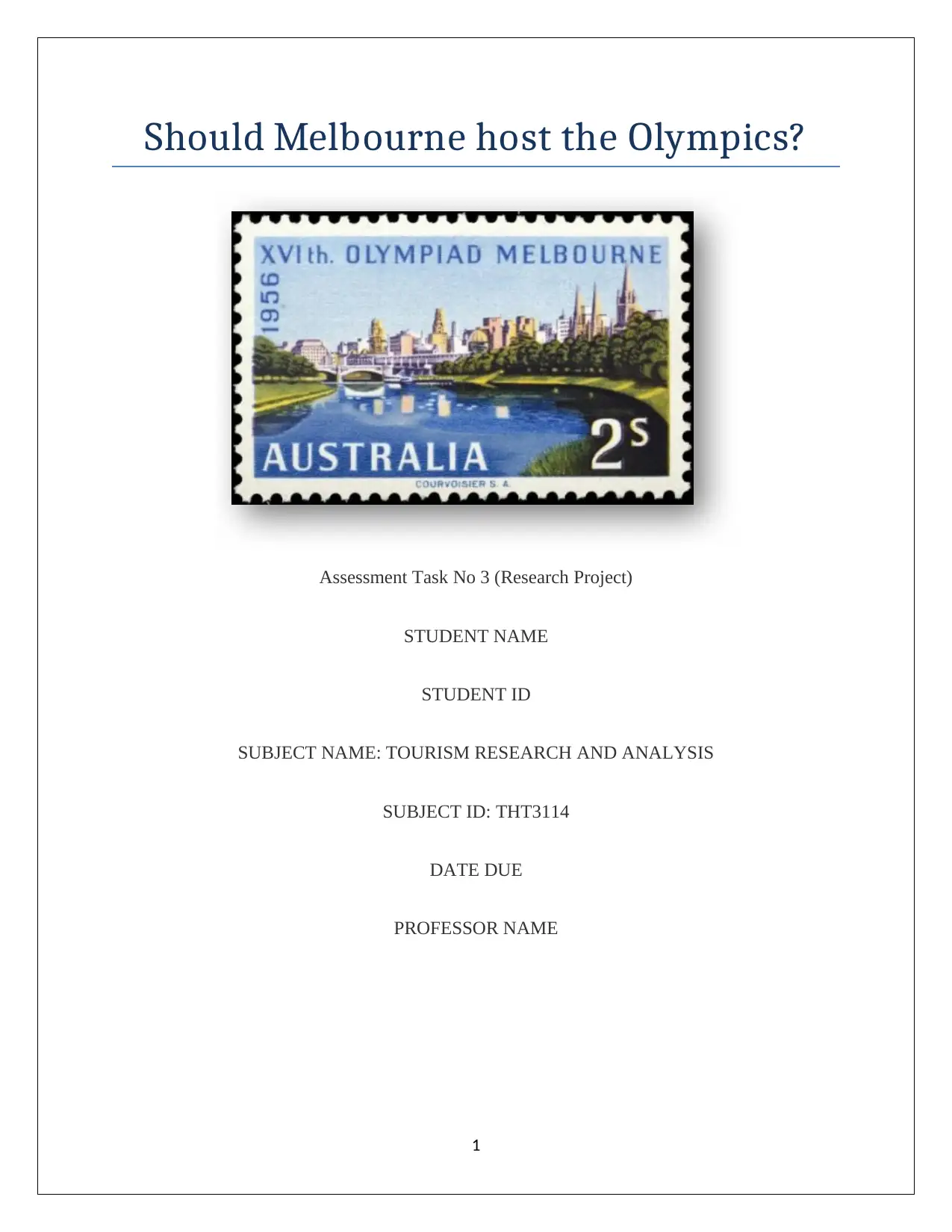
Should Melbourne host the Olympics?
Assessment Task No 3 (Research Project)
STUDENT NAME
STUDENT ID
SUBJECT NAME: TOURISM RESEARCH AND ANALYSIS
SUBJECT ID: THT3114
DATE DUE
PROFESSOR NAME
1
Assessment Task No 3 (Research Project)
STUDENT NAME
STUDENT ID
SUBJECT NAME: TOURISM RESEARCH AND ANALYSIS
SUBJECT ID: THT3114
DATE DUE
PROFESSOR NAME
1
Paraphrase This Document
Need a fresh take? Get an instant paraphrase of this document with our AI Paraphraser
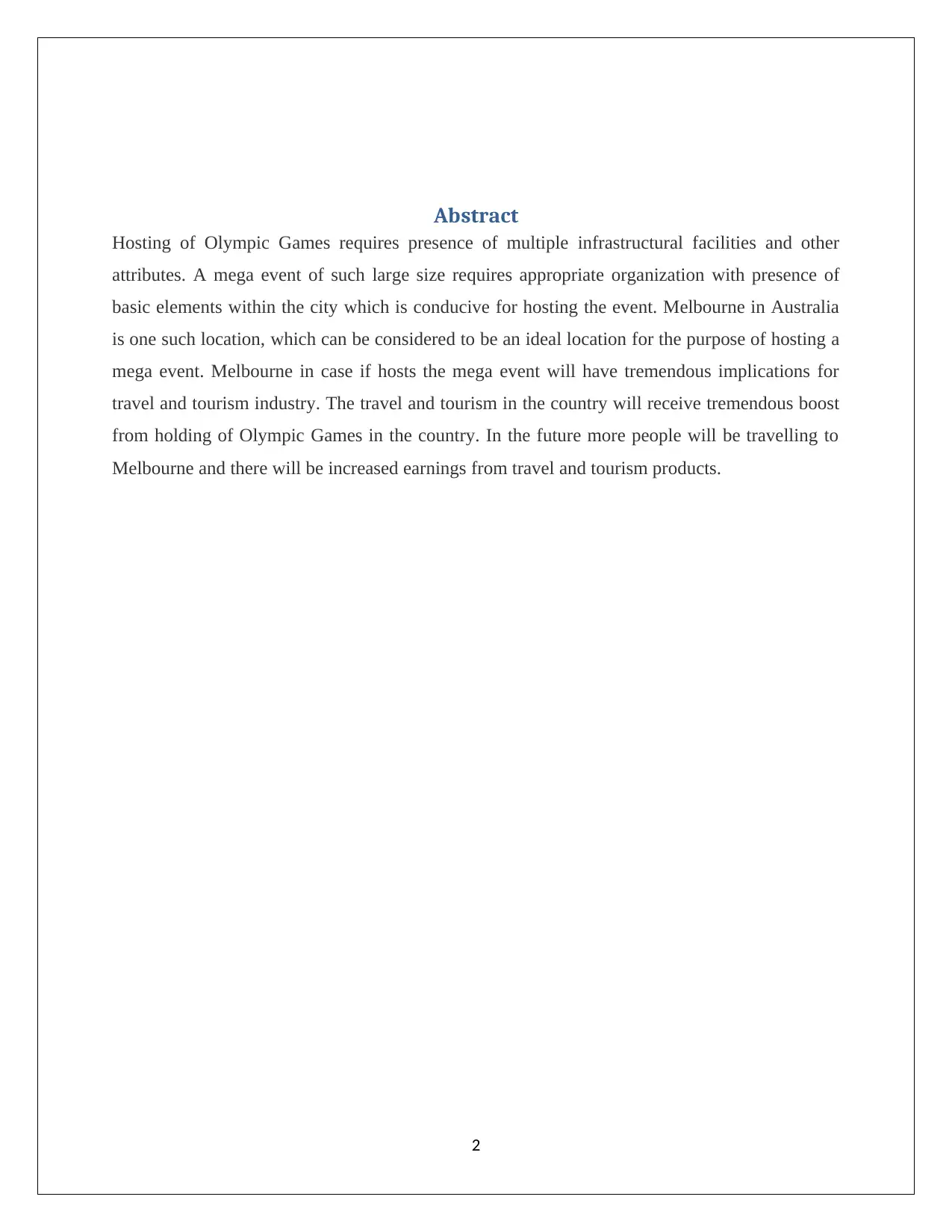
Abstract
Hosting of Olympic Games requires presence of multiple infrastructural facilities and other
attributes. A mega event of such large size requires appropriate organization with presence of
basic elements within the city which is conducive for hosting the event. Melbourne in Australia
is one such location, which can be considered to be an ideal location for the purpose of hosting a
mega event. Melbourne in case if hosts the mega event will have tremendous implications for
travel and tourism industry. The travel and tourism in the country will receive tremendous boost
from holding of Olympic Games in the country. In the future more people will be travelling to
Melbourne and there will be increased earnings from travel and tourism products.
2
Hosting of Olympic Games requires presence of multiple infrastructural facilities and other
attributes. A mega event of such large size requires appropriate organization with presence of
basic elements within the city which is conducive for hosting the event. Melbourne in Australia
is one such location, which can be considered to be an ideal location for the purpose of hosting a
mega event. Melbourne in case if hosts the mega event will have tremendous implications for
travel and tourism industry. The travel and tourism in the country will receive tremendous boost
from holding of Olympic Games in the country. In the future more people will be travelling to
Melbourne and there will be increased earnings from travel and tourism products.
2

Table of Contents
Abstract............................................................................................................................................2
1.0 Introduction................................................................................................................................4
2.0 Data Collection..........................................................................................................................4
3.0 Data Analysis.............................................................................................................................7
4.0 Research findings and contextualization...................................................................................8
5.0 Implications for the future.........................................................................................................9
6.0 REFERENCES LISTS.............................................................................................................10
3
Abstract............................................................................................................................................2
1.0 Introduction................................................................................................................................4
2.0 Data Collection..........................................................................................................................4
3.0 Data Analysis.............................................................................................................................7
4.0 Research findings and contextualization...................................................................................8
5.0 Implications for the future.........................................................................................................9
6.0 REFERENCES LISTS.............................................................................................................10
3
⊘ This is a preview!⊘
Do you want full access?
Subscribe today to unlock all pages.

Trusted by 1+ million students worldwide

1.0 Introduction
Australia is often considered as the sporting capital and has the infrastructure to host any large
games (Gold & Gold, 2008). Melbourne in Australia has capability to host second Olympic
Games. The topic whether Melbourne should host Olympic Games or not have gained immense
prominence. Hosting Olympic Games in Melbourne will have immense implications for the
tourism industry which includes airlines, hotels, travel rentals, restaurants and other local
businesses. The scope of the current analysis includes collecting data and thereafter analysing
those (Merkel & Kim, 2011). A proper evaluation of tourism and hospitality framework needs
evaluation for arriving at conclusive evidence regarding the subject.
2.0 Data Collection
Data collection process is critical for any study to be conducted. In this study data from
secondary sources have been taken into consideration such that methodology can develop and
applied to the Tourism and Hospitality sector. The following research questions will be aimed to
be attempted for the study.
Research Question 1: What is the reason s Melbourne can spell success for Olympic
Games?
Research Question 2: What is the current infrastructural facility at Melbourne for
hosting Olympics?
Research Question 3: What are the implications on travel and tourism industry by
hosting of Olympic Games?
There are various literature sources that have been taken into consideration in order to analyse
the topic in a more detailed manner. Feddersen Maennig and Zimmermann (2008) evaluate the
key factors which determine success for Olympic Games. Key success factors include presence
of infrastructural facilities, hotels, restaurants and communication facilities. Hiller (2012) in his
article identifies and evaluates the key attributes that needs to be present in cities for hosting the
Olympic Games. Billings and Holladay (2012) identifies the aftereffects of hosting mega event
4
Australia is often considered as the sporting capital and has the infrastructure to host any large
games (Gold & Gold, 2008). Melbourne in Australia has capability to host second Olympic
Games. The topic whether Melbourne should host Olympic Games or not have gained immense
prominence. Hosting Olympic Games in Melbourne will have immense implications for the
tourism industry which includes airlines, hotels, travel rentals, restaurants and other local
businesses. The scope of the current analysis includes collecting data and thereafter analysing
those (Merkel & Kim, 2011). A proper evaluation of tourism and hospitality framework needs
evaluation for arriving at conclusive evidence regarding the subject.
2.0 Data Collection
Data collection process is critical for any study to be conducted. In this study data from
secondary sources have been taken into consideration such that methodology can develop and
applied to the Tourism and Hospitality sector. The following research questions will be aimed to
be attempted for the study.
Research Question 1: What is the reason s Melbourne can spell success for Olympic
Games?
Research Question 2: What is the current infrastructural facility at Melbourne for
hosting Olympics?
Research Question 3: What are the implications on travel and tourism industry by
hosting of Olympic Games?
There are various literature sources that have been taken into consideration in order to analyse
the topic in a more detailed manner. Feddersen Maennig and Zimmermann (2008) evaluate the
key factors which determine success for Olympic Games. Key success factors include presence
of infrastructural facilities, hotels, restaurants and communication facilities. Hiller (2012) in his
article identifies and evaluates the key attributes that needs to be present in cities for hosting the
Olympic Games. Billings and Holladay (2012) identifies the aftereffects of hosting mega event
4
Paraphrase This Document
Need a fresh take? Get an instant paraphrase of this document with our AI Paraphraser
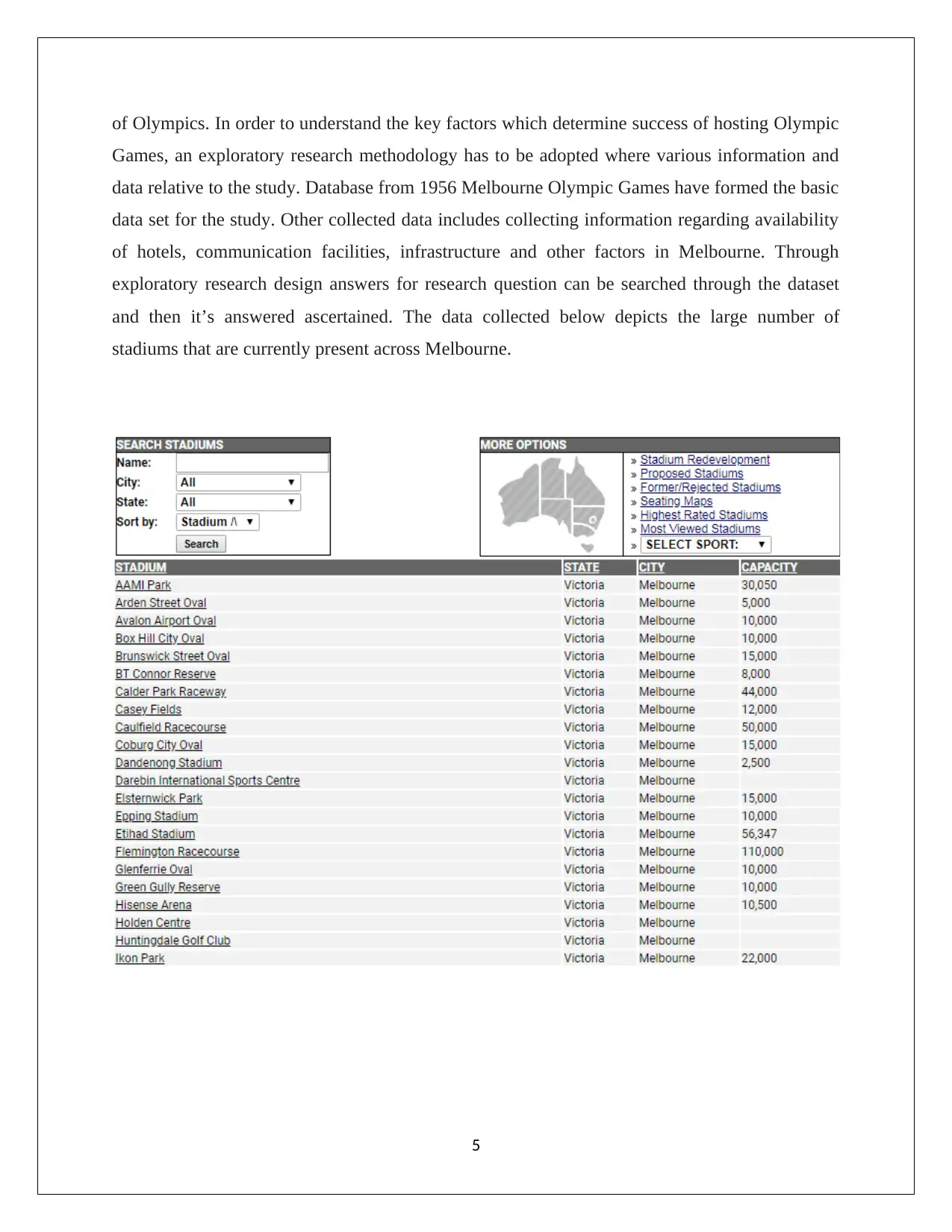
of Olympics. In order to understand the key factors which determine success of hosting Olympic
Games, an exploratory research methodology has to be adopted where various information and
data relative to the study. Database from 1956 Melbourne Olympic Games have formed the basic
data set for the study. Other collected data includes collecting information regarding availability
of hotels, communication facilities, infrastructure and other factors in Melbourne. Through
exploratory research design answers for research question can be searched through the dataset
and then it’s answered ascertained. The data collected below depicts the large number of
stadiums that are currently present across Melbourne.
5
Games, an exploratory research methodology has to be adopted where various information and
data relative to the study. Database from 1956 Melbourne Olympic Games have formed the basic
data set for the study. Other collected data includes collecting information regarding availability
of hotels, communication facilities, infrastructure and other factors in Melbourne. Through
exploratory research design answers for research question can be searched through the dataset
and then it’s answered ascertained. The data collected below depicts the large number of
stadiums that are currently present across Melbourne.
5
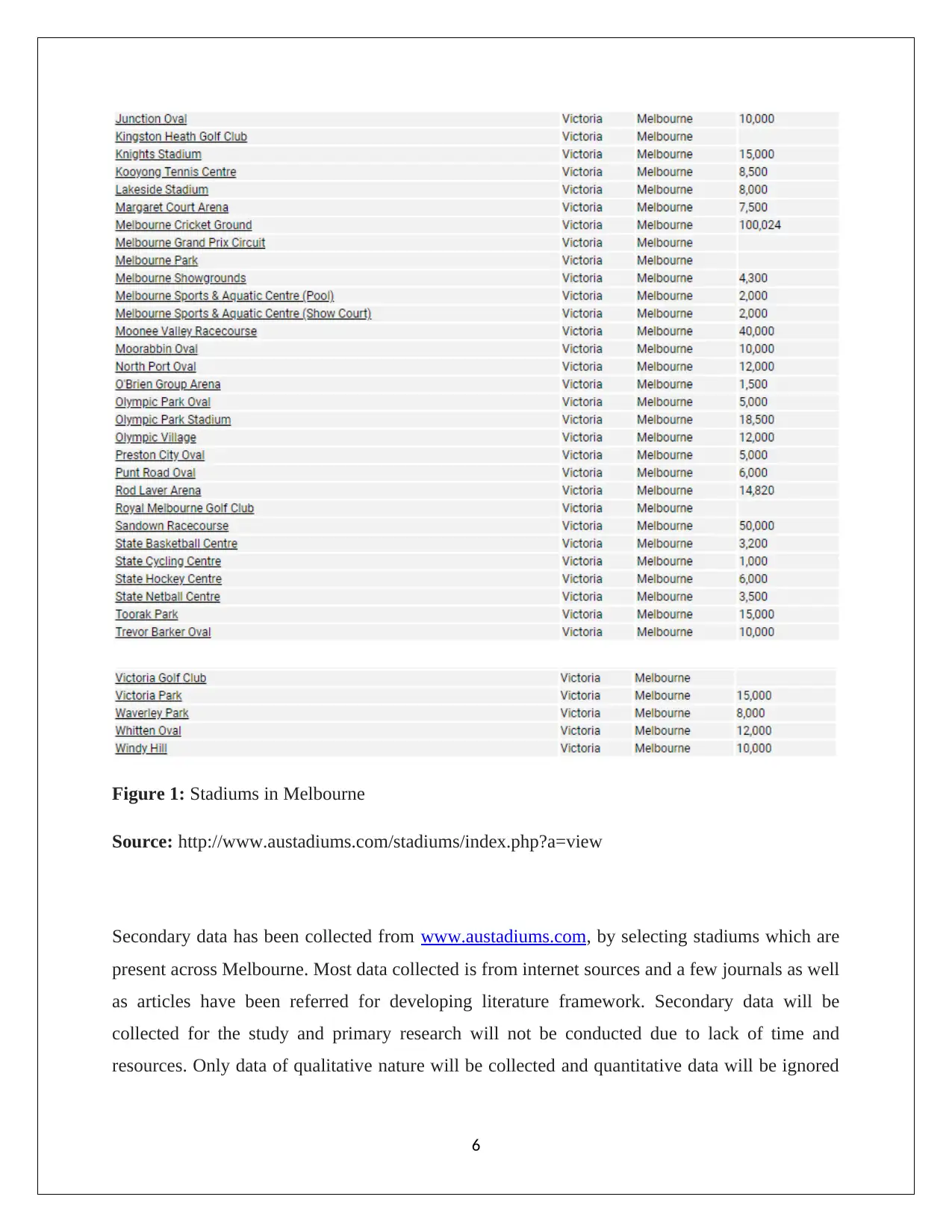
Figure 1: Stadiums in Melbourne
Source: http://www.austadiums.com/stadiums/index.php?a=view
Secondary data has been collected from www.austadiums.com, by selecting stadiums which are
present across Melbourne. Most data collected is from internet sources and a few journals as well
as articles have been referred for developing literature framework. Secondary data will be
collected for the study and primary research will not be conducted due to lack of time and
resources. Only data of qualitative nature will be collected and quantitative data will be ignored
6
Source: http://www.austadiums.com/stadiums/index.php?a=view
Secondary data has been collected from www.austadiums.com, by selecting stadiums which are
present across Melbourne. Most data collected is from internet sources and a few journals as well
as articles have been referred for developing literature framework. Secondary data will be
collected for the study and primary research will not be conducted due to lack of time and
resources. Only data of qualitative nature will be collected and quantitative data will be ignored
6
⊘ This is a preview!⊘
Do you want full access?
Subscribe today to unlock all pages.

Trusted by 1+ million students worldwide
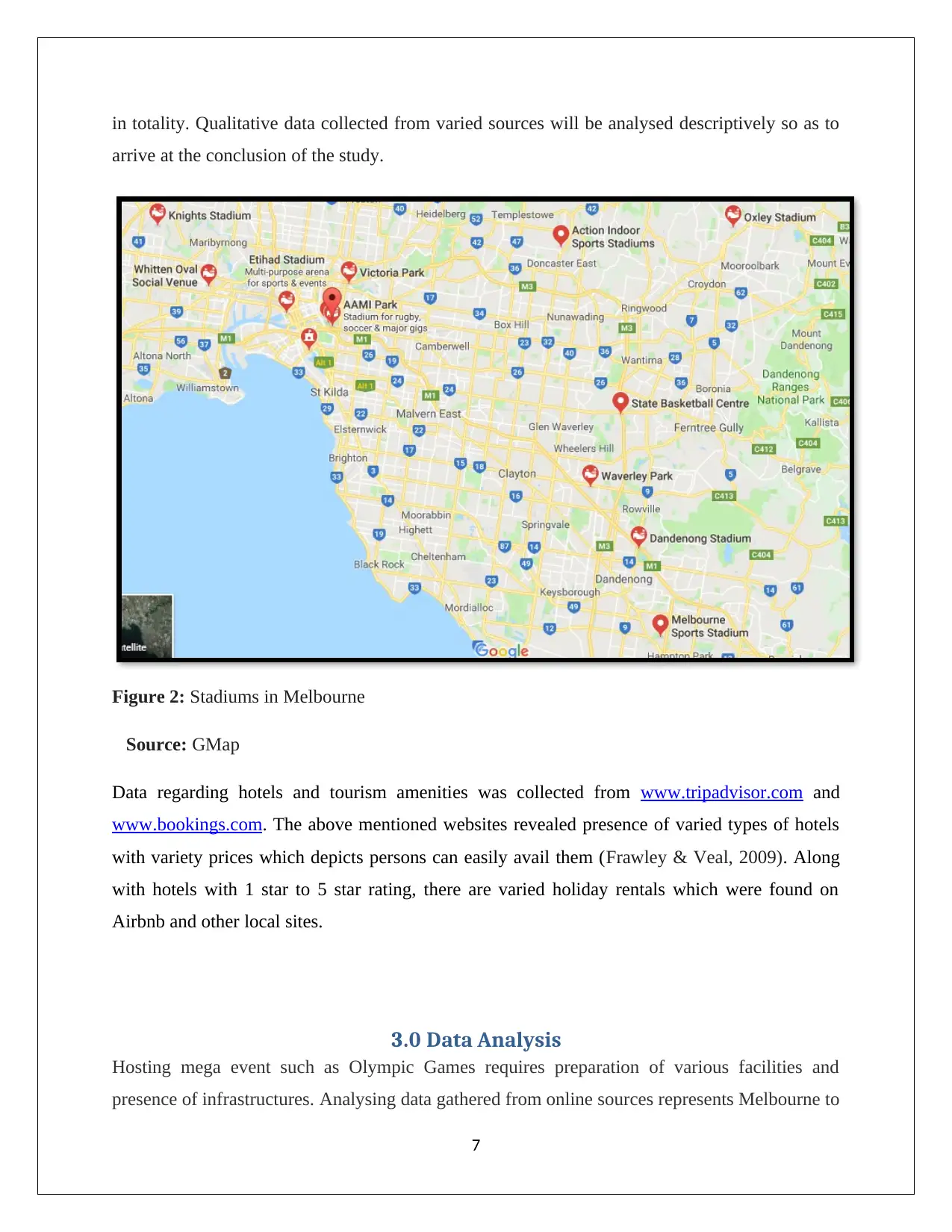
in totality. Qualitative data collected from varied sources will be analysed descriptively so as to
arrive at the conclusion of the study.
Figure 2: Stadiums in Melbourne
Source: GMap
Data regarding hotels and tourism amenities was collected from www.tripadvisor.com and
www.bookings.com. The above mentioned websites revealed presence of varied types of hotels
with variety prices which depicts persons can easily avail them (Frawley & Veal, 2009). Along
with hotels with 1 star to 5 star rating, there are varied holiday rentals which were found on
Airbnb and other local sites.
3.0 Data Analysis
Hosting mega event such as Olympic Games requires preparation of various facilities and
presence of infrastructures. Analysing data gathered from online sources represents Melbourne to
7
arrive at the conclusion of the study.
Figure 2: Stadiums in Melbourne
Source: GMap
Data regarding hotels and tourism amenities was collected from www.tripadvisor.com and
www.bookings.com. The above mentioned websites revealed presence of varied types of hotels
with variety prices which depicts persons can easily avail them (Frawley & Veal, 2009). Along
with hotels with 1 star to 5 star rating, there are varied holiday rentals which were found on
Airbnb and other local sites.
3.0 Data Analysis
Hosting mega event such as Olympic Games requires preparation of various facilities and
presence of infrastructures. Analysing data gathered from online sources represents Melbourne to
7
Paraphrase This Document
Need a fresh take? Get an instant paraphrase of this document with our AI Paraphraser
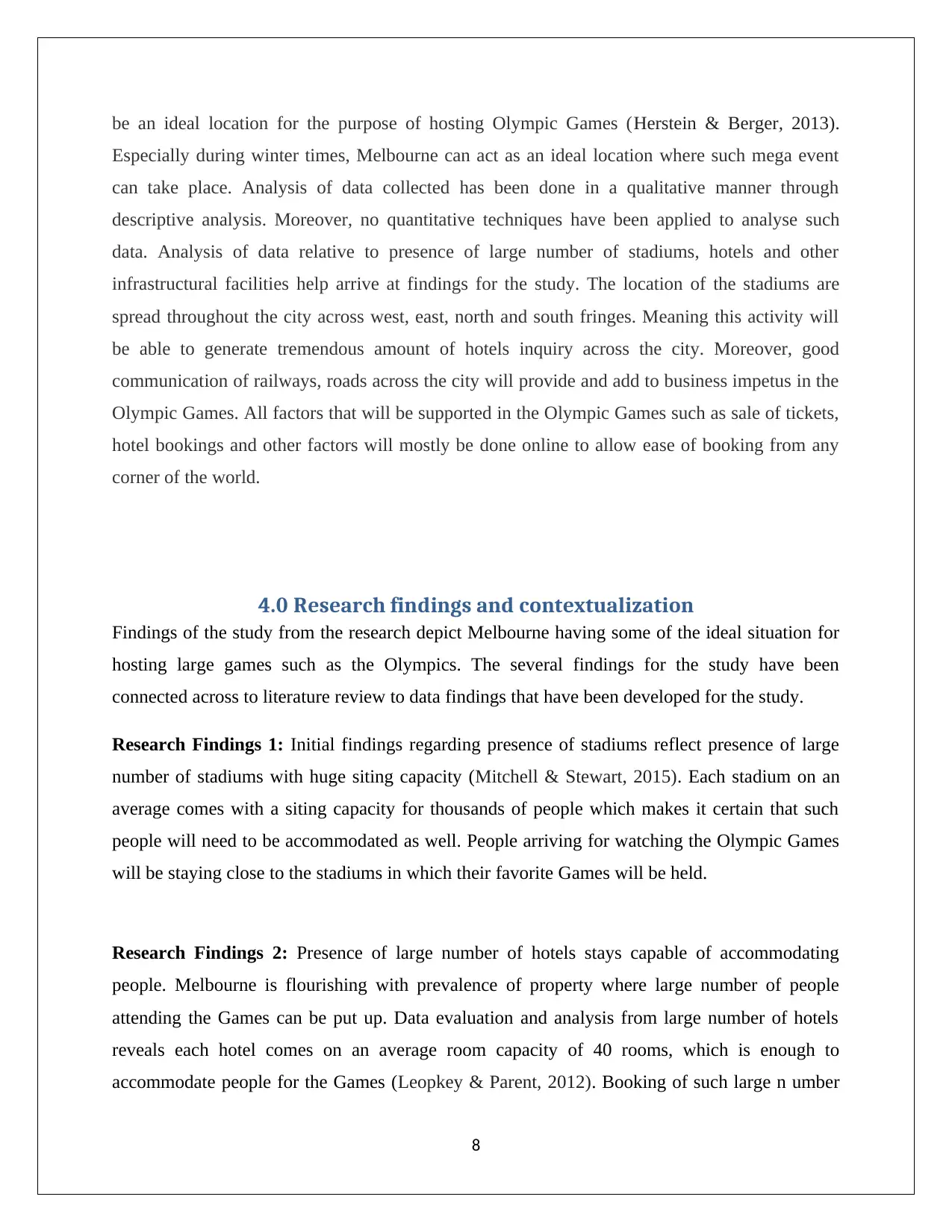
be an ideal location for the purpose of hosting Olympic Games (Herstein & Berger, 2013).
Especially during winter times, Melbourne can act as an ideal location where such mega event
can take place. Analysis of data collected has been done in a qualitative manner through
descriptive analysis. Moreover, no quantitative techniques have been applied to analyse such
data. Analysis of data relative to presence of large number of stadiums, hotels and other
infrastructural facilities help arrive at findings for the study. The location of the stadiums are
spread throughout the city across west, east, north and south fringes. Meaning this activity will
be able to generate tremendous amount of hotels inquiry across the city. Moreover, good
communication of railways, roads across the city will provide and add to business impetus in the
Olympic Games. All factors that will be supported in the Olympic Games such as sale of tickets,
hotel bookings and other factors will mostly be done online to allow ease of booking from any
corner of the world.
4.0 Research findings and contextualization
Findings of the study from the research depict Melbourne having some of the ideal situation for
hosting large games such as the Olympics. The several findings for the study have been
connected across to literature review to data findings that have been developed for the study.
Research Findings 1: Initial findings regarding presence of stadiums reflect presence of large
number of stadiums with huge siting capacity (Mitchell & Stewart, 2015). Each stadium on an
average comes with a siting capacity for thousands of people which makes it certain that such
people will need to be accommodated as well. People arriving for watching the Olympic Games
will be staying close to the stadiums in which their favorite Games will be held.
Research Findings 2: Presence of large number of hotels stays capable of accommodating
people. Melbourne is flourishing with prevalence of property where large number of people
attending the Games can be put up. Data evaluation and analysis from large number of hotels
reveals each hotel comes on an average room capacity of 40 rooms, which is enough to
accommodate people for the Games (Leopkey & Parent, 2012). Booking of such large n umber
8
Especially during winter times, Melbourne can act as an ideal location where such mega event
can take place. Analysis of data collected has been done in a qualitative manner through
descriptive analysis. Moreover, no quantitative techniques have been applied to analyse such
data. Analysis of data relative to presence of large number of stadiums, hotels and other
infrastructural facilities help arrive at findings for the study. The location of the stadiums are
spread throughout the city across west, east, north and south fringes. Meaning this activity will
be able to generate tremendous amount of hotels inquiry across the city. Moreover, good
communication of railways, roads across the city will provide and add to business impetus in the
Olympic Games. All factors that will be supported in the Olympic Games such as sale of tickets,
hotel bookings and other factors will mostly be done online to allow ease of booking from any
corner of the world.
4.0 Research findings and contextualization
Findings of the study from the research depict Melbourne having some of the ideal situation for
hosting large games such as the Olympics. The several findings for the study have been
connected across to literature review to data findings that have been developed for the study.
Research Findings 1: Initial findings regarding presence of stadiums reflect presence of large
number of stadiums with huge siting capacity (Mitchell & Stewart, 2015). Each stadium on an
average comes with a siting capacity for thousands of people which makes it certain that such
people will need to be accommodated as well. People arriving for watching the Olympic Games
will be staying close to the stadiums in which their favorite Games will be held.
Research Findings 2: Presence of large number of hotels stays capable of accommodating
people. Melbourne is flourishing with prevalence of property where large number of people
attending the Games can be put up. Data evaluation and analysis from large number of hotels
reveals each hotel comes on an average room capacity of 40 rooms, which is enough to
accommodate people for the Games (Leopkey & Parent, 2012). Booking of such large n umber
8
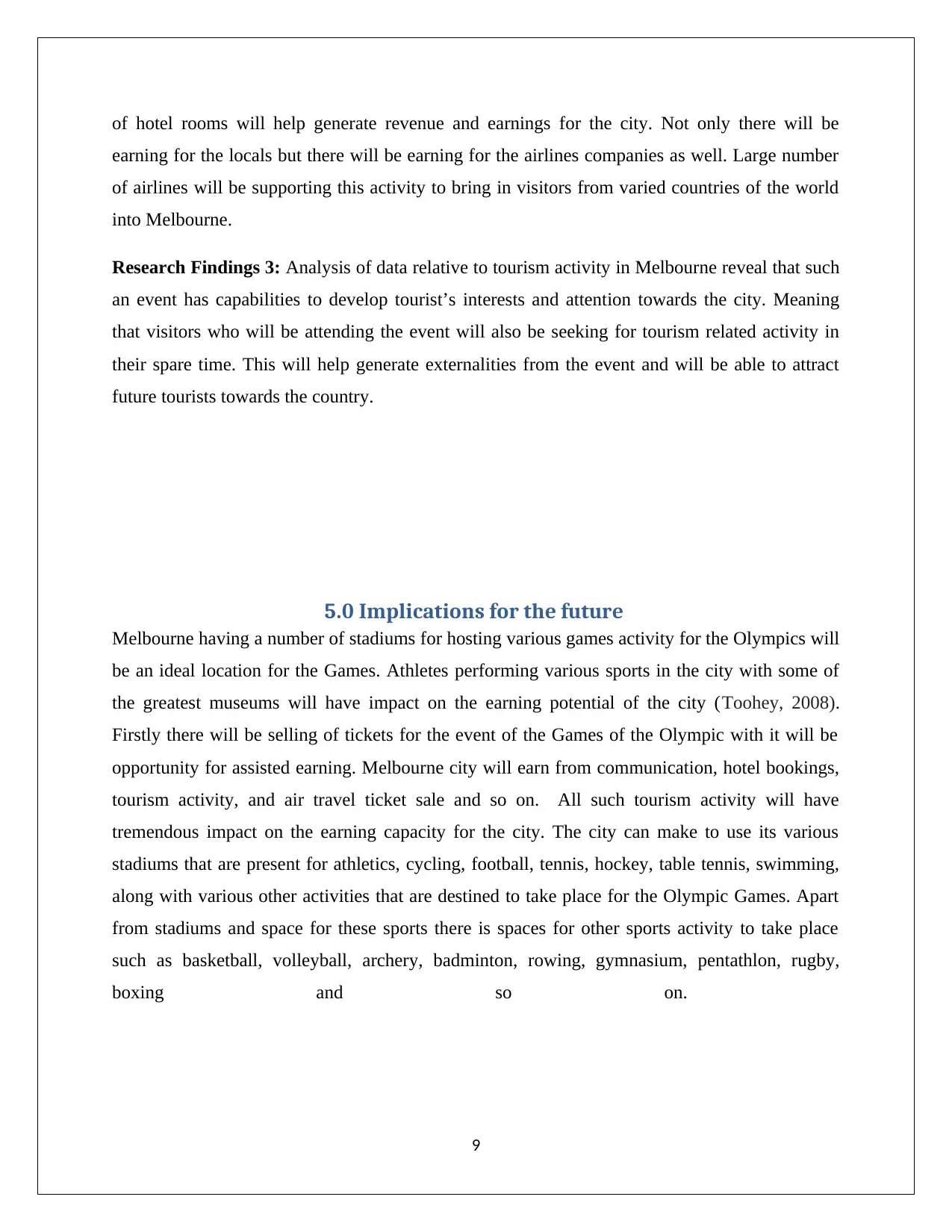
of hotel rooms will help generate revenue and earnings for the city. Not only there will be
earning for the locals but there will be earning for the airlines companies as well. Large number
of airlines will be supporting this activity to bring in visitors from varied countries of the world
into Melbourne.
Research Findings 3: Analysis of data relative to tourism activity in Melbourne reveal that such
an event has capabilities to develop tourist’s interests and attention towards the city. Meaning
that visitors who will be attending the event will also be seeking for tourism related activity in
their spare time. This will help generate externalities from the event and will be able to attract
future tourists towards the country.
5.0 Implications for the future
Melbourne having a number of stadiums for hosting various games activity for the Olympics will
be an ideal location for the Games. Athletes performing various sports in the city with some of
the greatest museums will have impact on the earning potential of the city (Toohey, 2008).
Firstly there will be selling of tickets for the event of the Games of the Olympic with it will be
opportunity for assisted earning. Melbourne city will earn from communication, hotel bookings,
tourism activity, and air travel ticket sale and so on. All such tourism activity will have
tremendous impact on the earning capacity for the city. The city can make to use its various
stadiums that are present for athletics, cycling, football, tennis, hockey, table tennis, swimming,
along with various other activities that are destined to take place for the Olympic Games. Apart
from stadiums and space for these sports there is spaces for other sports activity to take place
such as basketball, volleyball, archery, badminton, rowing, gymnasium, pentathlon, rugby,
boxing and so on.
9
earning for the locals but there will be earning for the airlines companies as well. Large number
of airlines will be supporting this activity to bring in visitors from varied countries of the world
into Melbourne.
Research Findings 3: Analysis of data relative to tourism activity in Melbourne reveal that such
an event has capabilities to develop tourist’s interests and attention towards the city. Meaning
that visitors who will be attending the event will also be seeking for tourism related activity in
their spare time. This will help generate externalities from the event and will be able to attract
future tourists towards the country.
5.0 Implications for the future
Melbourne having a number of stadiums for hosting various games activity for the Olympics will
be an ideal location for the Games. Athletes performing various sports in the city with some of
the greatest museums will have impact on the earning potential of the city (Toohey, 2008).
Firstly there will be selling of tickets for the event of the Games of the Olympic with it will be
opportunity for assisted earning. Melbourne city will earn from communication, hotel bookings,
tourism activity, and air travel ticket sale and so on. All such tourism activity will have
tremendous impact on the earning capacity for the city. The city can make to use its various
stadiums that are present for athletics, cycling, football, tennis, hockey, table tennis, swimming,
along with various other activities that are destined to take place for the Olympic Games. Apart
from stadiums and space for these sports there is spaces for other sports activity to take place
such as basketball, volleyball, archery, badminton, rowing, gymnasium, pentathlon, rugby,
boxing and so on.
9
⊘ This is a preview!⊘
Do you want full access?
Subscribe today to unlock all pages.

Trusted by 1+ million students worldwide
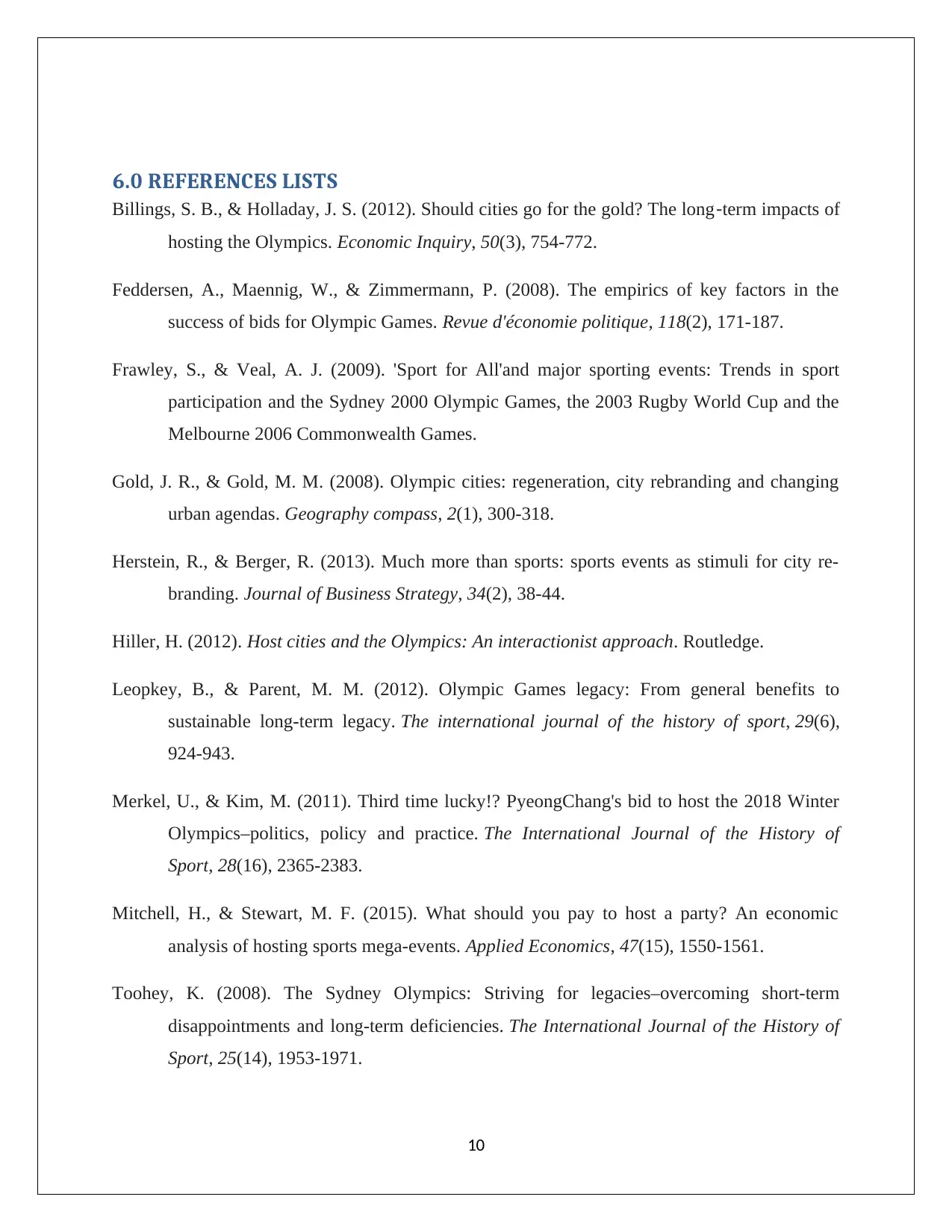
6.0 REFERENCES LISTS
Billings, S. B., & Holladay, J. S. (2012). Should cities go for the gold? The long‐term impacts of
hosting the Olympics. Economic Inquiry, 50(3), 754-772.
Feddersen, A., Maennig, W., & Zimmermann, P. (2008). The empirics of key factors in the
success of bids for Olympic Games. Revue d'économie politique, 118(2), 171-187.
Frawley, S., & Veal, A. J. (2009). 'Sport for All'and major sporting events: Trends in sport
participation and the Sydney 2000 Olympic Games, the 2003 Rugby World Cup and the
Melbourne 2006 Commonwealth Games.
Gold, J. R., & Gold, M. M. (2008). Olympic cities: regeneration, city rebranding and changing
urban agendas. Geography compass, 2(1), 300-318.
Herstein, R., & Berger, R. (2013). Much more than sports: sports events as stimuli for city re-
branding. Journal of Business Strategy, 34(2), 38-44.
Hiller, H. (2012). Host cities and the Olympics: An interactionist approach. Routledge.
Leopkey, B., & Parent, M. M. (2012). Olympic Games legacy: From general benefits to
sustainable long-term legacy. The international journal of the history of sport, 29(6),
924-943.
Merkel, U., & Kim, M. (2011). Third time lucky!? PyeongChang's bid to host the 2018 Winter
Olympics–politics, policy and practice. The International Journal of the History of
Sport, 28(16), 2365-2383.
Mitchell, H., & Stewart, M. F. (2015). What should you pay to host a party? An economic
analysis of hosting sports mega-events. Applied Economics, 47(15), 1550-1561.
Toohey, K. (2008). The Sydney Olympics: Striving for legacies–overcoming short-term
disappointments and long-term deficiencies. The International Journal of the History of
Sport, 25(14), 1953-1971.
10
Billings, S. B., & Holladay, J. S. (2012). Should cities go for the gold? The long‐term impacts of
hosting the Olympics. Economic Inquiry, 50(3), 754-772.
Feddersen, A., Maennig, W., & Zimmermann, P. (2008). The empirics of key factors in the
success of bids for Olympic Games. Revue d'économie politique, 118(2), 171-187.
Frawley, S., & Veal, A. J. (2009). 'Sport for All'and major sporting events: Trends in sport
participation and the Sydney 2000 Olympic Games, the 2003 Rugby World Cup and the
Melbourne 2006 Commonwealth Games.
Gold, J. R., & Gold, M. M. (2008). Olympic cities: regeneration, city rebranding and changing
urban agendas. Geography compass, 2(1), 300-318.
Herstein, R., & Berger, R. (2013). Much more than sports: sports events as stimuli for city re-
branding. Journal of Business Strategy, 34(2), 38-44.
Hiller, H. (2012). Host cities and the Olympics: An interactionist approach. Routledge.
Leopkey, B., & Parent, M. M. (2012). Olympic Games legacy: From general benefits to
sustainable long-term legacy. The international journal of the history of sport, 29(6),
924-943.
Merkel, U., & Kim, M. (2011). Third time lucky!? PyeongChang's bid to host the 2018 Winter
Olympics–politics, policy and practice. The International Journal of the History of
Sport, 28(16), 2365-2383.
Mitchell, H., & Stewart, M. F. (2015). What should you pay to host a party? An economic
analysis of hosting sports mega-events. Applied Economics, 47(15), 1550-1561.
Toohey, K. (2008). The Sydney Olympics: Striving for legacies–overcoming short-term
disappointments and long-term deficiencies. The International Journal of the History of
Sport, 25(14), 1953-1971.
10
1 out of 10
Your All-in-One AI-Powered Toolkit for Academic Success.
+13062052269
info@desklib.com
Available 24*7 on WhatsApp / Email
![[object Object]](/_next/static/media/star-bottom.7253800d.svg)
Unlock your academic potential
Copyright © 2020–2026 A2Z Services. All Rights Reserved. Developed and managed by ZUCOL.
